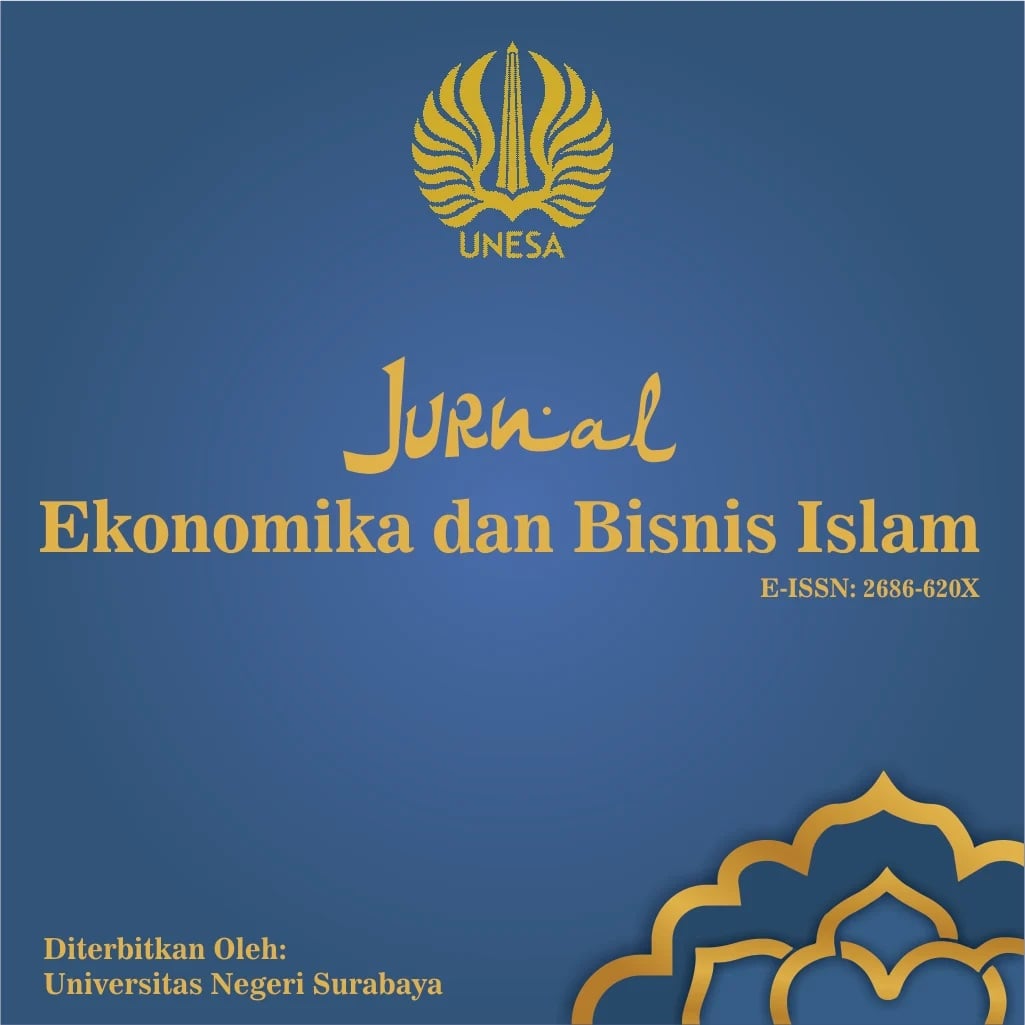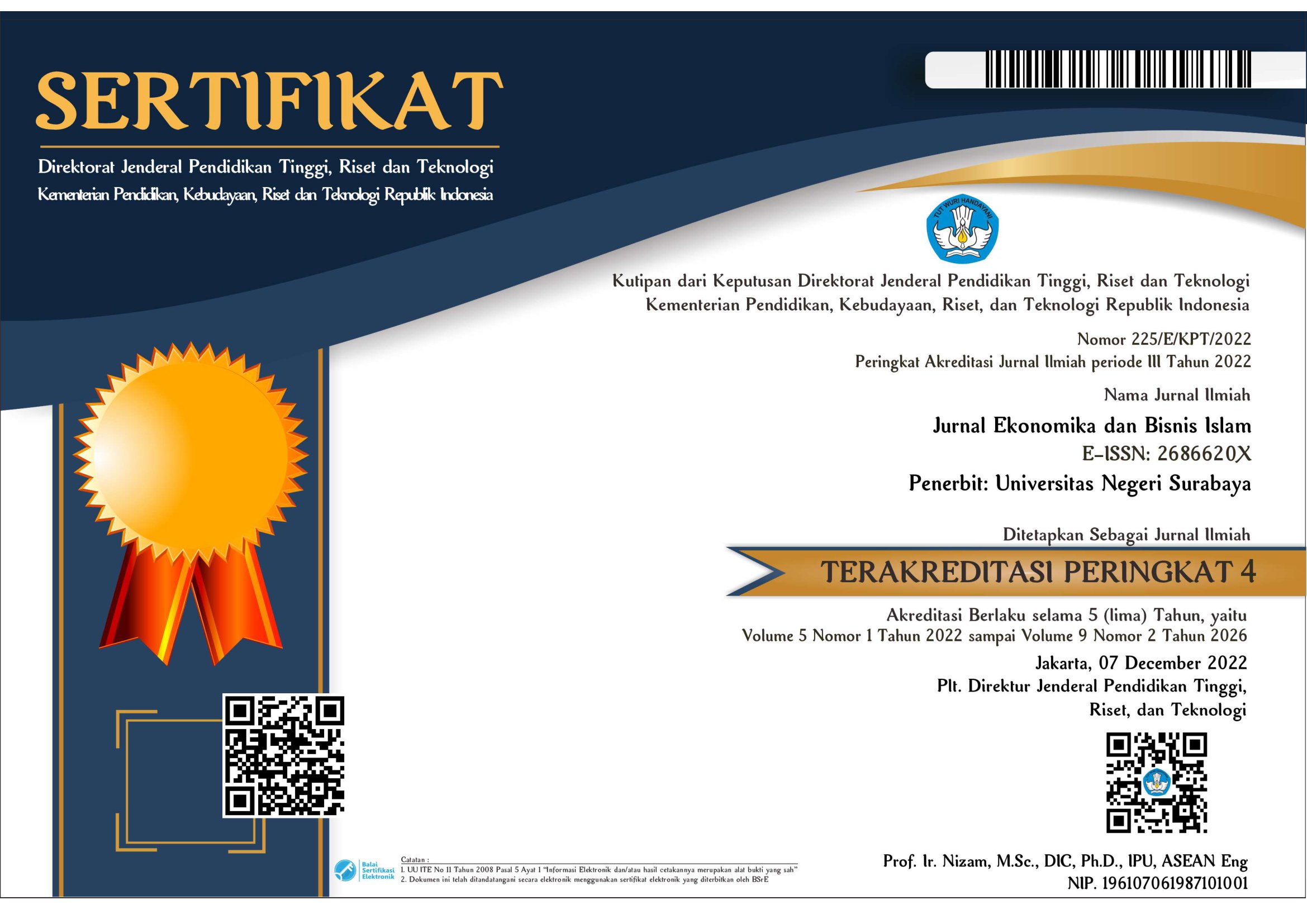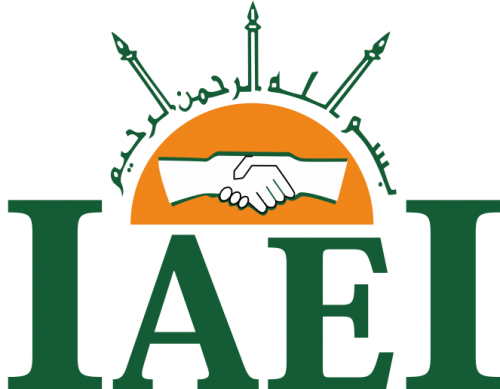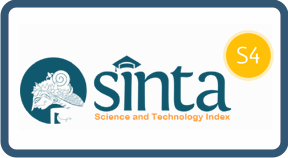Pengaruh Literasi Keuangan Dan Pendapatan Perkapita Terhadap Konsumsi Rumah Tangga di Indonesia: Analisis Ekonomi Islam
DOI:
https://doi.org/10.26740/jekobi.v8n2.p20-35Keywords:
GRDP Per Capita, Financial Literacy, Household Consumption, Islamic ConsumptionAbstract
The decline in people's purchasing power and weakening household consumption growth in recent years pose serious challenges for the Indonesian economy. Financial literacy and income inequality are thought to be factors that influence people's consumption behavior. This study aims to analyze the effect of financial literacy and per capita income on household consumption in Indonesia from an Islamic economic perspective. A quantitative approach was used with panel data regression analysis through the Fixed Effect Estimated Generalized Least Squares (EGLS) model. The data used was secondary data from 34 provinces in Indonesia for the three periods of 2016, 2019, and 2022, sourced from the Financial Services Authority (OJK) and the Central Statistics Agency (BPS). The results of the study show that financial literacy and per capita income have a positive and significant effect on household consumption, which means that the higher the level of literacy and income, the greater the level of consumption. These findings emphasize the importance of improving financial literacy as an effort to strengthen household financial welfare. From an Islamic economic perspective, the results of this study emphasize the importance of fair, balanced, and socially oriented consumption behavior as a manifestation of the implementation of the maqashid sharia principle, which will encourage wiser and more sustainable household financial management.
References
Afif, M. N. (2019). Pengaruh Kemiskinan, Pendapatan Per Kapita, Harga Rokok, Produksi Rokok Terhadap Konsumsi Rokok Di Indonesia. Diponegoro Journal Of Economics, 1, 88–96.
Alizadeh Emamzadeh, M. R. (2020). Analysis of economic convergence of Islamic justice in selected Islamic countries. Journal of Economic Structures, 9(1). https://doi.org/10.1186/s40008-020-00191-8
Anundsen, A. K., & Nymoen, R. (2019). Testing the Empirical Relevance of the ‘Saving for a Rainy Day’ Hypothesis in US Metro Areas. Oxford Bulletin of Economics and Statistics, 81(6), 1318–1335. https://doi.org/10.1111/obes.12310
Azhari, F. (2022). Pengaruh Pendapatan Terhadap Konsumsi Rumah Tangga Di Kampung Banyusuci Bogor. Jurnal An Nuqud, 1(1), 33–40.
Basuki, A. T., & Yuliadi, I. (2015). Electronic data processing. In Danisa Media (Revisi). Danisa Media. https://doi.org/10.2307/3008753
Baulkaran, V. (2022). Personal bankruptcy and consumer credit delinquency: The case of personal finance education. International Review of Financial Analysis, 81, 102098. https://doi.org/10.1016/j.irfa.2022.102098
BPS. (2024). Perkembangan Indeks Harga Konsumen September 2024. https://www.bps.go.id/id/infographic?id=1050
Chen, Q., Kang, X., & Wang, Y. (2023). Financial Literacy and Consumption Inequality of Chinese Households — Evidence from CHFS Data. 1–36. https://doi.org/https://doi.org/10.21203/rs.3.rs-3041113/v1 License:
Chu, Z., Wang, Z., Xiao, J. J., & Zhang, W. (2017). Financial Literacy, Portfolio Choice and Financial Well-Being. Social Indicators Research, 132(2), 799–820. https://doi.org/10.1007/s11205-016-1309-2
Deviyana, N. (2024). Deflasi Lima Bulan Beruntun di 2024, Benarkah Ada Penurunan Daya Beli Masyarakat RI? IDX Channel. https://www.idxchannel.com/economics/deflasi-lima-bulan-beruntun-di-2024-benarkah-ada-penurunan-daya-beli-masyarakat-ri
Dinkova, M., Kalwij, A., & Alessie, R. (2021). Know More, Spend More? The Impact of Financial Literacy on Household Consumption. De Economist, 169(4), 469–498. https://doi.org/10.1007/s10645-021-09391-4
French, D. (2023). Exploring household financial strain dynamics. International Review of Financial Analysis, 86, 102469. https://doi.org/10.1016/j.irfa.2022.102469
Furqani, H. (2017). Consumption and morality: Principles and behavioral framework in Islamic economics. Journal of King Abdulaziz University, Islamic Economics, 30(Specialissue), 89–102. https://doi.org/10.4197/Islec.30-SI.6
Furqon, I. K. (2018). TEORI KONSUMSI dalam ISLAM. Adzkiya : Jurnal Hukum Dan Ekonomi Syariah, 6(1), 1–18. https://doi.org/10.32332/adzkiya.v6i1.1169
Iftikhar, H., Pinglu, C., Ullah, S., & Ullah, A. (2022). Impact of tourism on sustainable development in BRI countries: The moderating role of institutional quality. PLOS ONE, 17(4), e0263745. https://doi.org/10.1371/journal.pone.0263745
Karonen, E., & Niemelä, M. (2022). Necessity-Rich, Leisure-Poor: The Long-Term Relationship Between Income Cohorts and Consumption Through Age-Period-Cohort Analysis. Journal of Family and Economic Issues, 43(3), 599–620. https://doi.org/10.1007/s10834-021-09781-5
Kraft, H., Munk, C., & Wagner, S. (2018). Housing habits and their implications for life-cycle consumption and investment. Review of Finance, 22(5), 1737–1762. https://doi.org/10.1093/rof/rfx048
Kusairi, S., Sanusi, N. A., Muhamad, S., Shukri, M., & Zamri, N. (2020). Linkages of Financial Efficacy, Demographics, Risks Preference and Consumption Behavior in Malaysia. The Journal of Asian Finance, Economics and Business, 7(9), 673–685. https://doi.org/10.13106/jafeb.2020.vol7.no9.673
Lu, X., Xiao, J., & Wu, Y. (2021). Financial literacy and household asset allocation: Evidence from micro‐data in China. Journal of Consumer Affairs, 55(4), 1464–1488. https://doi.org/10.1111/joca.12406
Luo, Z., Azam, S. M. F., & Wang, L. (2023). Impact of financial literacy on household stock profit level in China. PLOS ONE, 18(12), e0296100. https://doi.org/10.1371/journal.pone.0296100
Ma, Y., Song, Y., Xia, N., & Zhu, J. (2022). The Impact of Financial Literacy on Household Consumption. Frontiers in Business, Economics and Management, 5(3), 55–63. https://doi.org/10.54097/fbem.v5i3.1908
Mance, D., Vilke, S., & Debelic, B. (2020). Sustainable Governance of Coastal Areas and Tourism Impact on Waste Production : Panel Analysis of Croatian Municipalities. Sustainability, 12, 1–16.
Mannan, M. A. (1997). Ekonomi Islam: Teori dan Praktik. Dana Bakti.
Marla, P. G., Majid, M. S. A., Musnadi, S., Agustina, M., Faisal, F., & Nurdin, R. (2025). Exploring the Nexus between Digital Finance , Social Capital , Financial Literacy , and Islamic Financial Inclusion in Banda Aceh , Indonesia. 2023 International Conference on Sustainable Islamic Business and Finance (SIBF), 281–285. https://doi.org/10.1109/SIBF60067.2023.10380012
Martini, A., & Spataro, L. (2024). At the origins of the life cycle hypothesis of Franco Modigliani and Richard Brumberg: an attempt at analysis. European Journal of the History of Economic Thought, 31(1), 77–110. https://doi.org/10.1080/09672567.2023.2238858
Merry, K. E., Webster, F., & Kucharczyk, S. (2022). Investing in Students With Extensive Support Needs: Steps to Integrate Personal Financial Literacy in Inclusive Settings for Educators, Students, and Families. Inclusive Practices, 1(4), 156–170. https://doi.org/10.1177/27324745221128931
Murendo, C., & Mutsonziwa, K. (2017). Financial literacy and savings decisions by adult financial consumers in Zimbabwe. International Journal of Consumer Studies, 41(1), 95–103. https://doi.org/10.1111/ijcs.12318
Nailufar, F., Jannah, M., & Juanda, R. (2022). Jurnal Ilmiah Ekonomi Terpadu ( Jimetera ) Pengaruh Inflasi dan Pendapatan Perkapita terhadap Konsumsi Rumah Tangga di Provinsi Aceh. 2(2), 140–147.
Nguyen, G. (2020). Changes in the distribution of household consumption in Southeast Asia. Economic Change and Restructuring, 53(1), 39–60. https://doi.org/10.1007/s10644-018-9236-7
Nurhadi, M. (2024). Data Mengejutkan Penurunan Daya Beli Masyarakat 2019-2024, Apa Penyebabnya? Suara.Com. https://www.suara.com/bisnis/2024/09/29/140908/data-mengejutkan-penurunan-daya-beli-masyarakat-2019-2024-apa-penyebabnya
O’Donnell, R. (2018). Clarifying Keynes’s Theory Of Consumption And Psychological Law. History of Economics Review, 71(1), 94–117. https://doi.org/10.1080/10370196.2019.1602859
Rachmah, H., Tsaury, A. M., Khambali, Enoh, & Surbiantoro, E. (2021). Tabdzir prohibition education in overcoming consumptive behavior. IOP Conference Series: Earth and Environmental Science, 747(1). https://doi.org/10.1088/1755-1315/747/1/012023
Rachman, A. (2024). Semua Menjerit, Daya Beli Warga RI Ambruk! CNBC Indonesia. https://www.cnbcindonesia.com/news/20241225171108-4-598704/semua-menjerit-daya-beli-warga-ri-ambruk
Razak, S. H. A. R. (2020). Zakat and waqf as instrument of Islamic wealth in poverty alleviation and redistribution. International Journal of Sociology and Social Policy, 40(3), 249–266. https://doi.org/10.1108/IJSSP-11-2018-0208
Rukmana, R., & Munandar, A. (2024). JIMEA | Jurnal Ilmiah MEA ( Manajemen , Ekonomi , dan Akuntansi ). 8(1), 1899–1916.
Sconti, A. (2024). Having Trouble Making Ends Meet? Financial Literacy Makes the Difference. Italian Economic Journal, 10(1), 377–408. https://doi.org/10.1007/s40797-022-00212-4
Shaikh, S. A. (2018). Capitalizing on Economic Function of the Institution of Zakāt in Modern Economy. International Journal of Zakat, 33–49.
Shi, L., & Lim, T. (2023). Household Financial Literacy: A Literature Analysis and Review (pp. 436–447). https://doi.org/10.2991/978-94-6463-270-5_49
Tran, N. Van. (2022). Behaviour : What do we Learn from a Developing Country ? B.E. Journal of Economic Analysis and Policy, 22(4), 801–858.
Twumasi, M. A., Jiang, Y., Ding, Z., Wang, P., & Abgenyo, W. (2022). The Mediating Role of Access to Financial Services in the Effect of Financial Literacy on Household Income: The Case of Rural Ghana. Sage Open, 12(1). https://doi.org/10.1177/21582440221079921
van Rooij, M. C. J., Lusardi, A., & Alessie, R. J. M. (2012). Financial Literacy, Retirement Planning and Household Wealth. The Economic Journal, 122(560), 449–478. https://doi.org/10.1111/j.1468-0297.2012.02501.x
Wang, S., Cao, P., & Huang, S. (2022). Household financial literacy and relative poverty: An analysis of the psychology of poverty and market participation. Frontiers in Psychology, 13. https://doi.org/10.3389/fpsyg.2022.898486
Wijaya, H. R., Hati, S. R. H., Ekaputra, I. A., & Kassim, S. (2024). The impact of religiosity and financial literacy on financial management behavior and well-being among Indonesian Muslims. Humanities and Social Sciences Communications, 2024, 1–13. https://doi.org/10.1057/s41599-024-03309-6
Wostner, S. Š., Križanič, F., Brezovnik, B., & Vojinović, B. (2022). The Role of Personal Consumption in the Economic System–Case of Slovenia. Eastern European Economics, 60(5), 433–451. https://doi.org/10.1080/00128775.2022.2098146
Xie, Q., Ke, H., & Peng, J. (2024). Impacts of Financial Literacy on Elderly Households ’ Consumption. Finance Research Letters, 62(PA), 105146. https://doi.org/10.1016/j.frl.2024.105146
Yin, Y., Qamruzzaman, M., Xiao, H., Mehta, A. M., Naqvi, F. N., & Baig, I. A. (2022). Nexus between uncertainty, remittances, and households consumption: Evidence from dynamic SUR application. Frontiers in Environmental Science, 10. https://doi.org/10.3389/fenvs.2022.950067
Yuli, A. (2013). Analisis Pengaruh Pendapatan Nasional, Inflasi, Dan Suku Bunga Terhadap Konsumsi Rumah Tangga Di Indonesia. Jurnal Ekonomi, 2(1), 56.
Yulita, N. N., & Manunggal, S. A. M. (2024). Al-Kharaj : Jurnal Ekonomi , Keuangan & Bisnis Syariah Hidup terhadap Pengeluaran Konsumsi Rumah Tangga di Al-Kharaj : Jurnal Ekonomi , Keuangan & Bisnis Syariah. 6(2), 1065–1081. https://doi.org/10.47467/alkharaj.v6i2.3957
Zokaityte, A. (2016). Financial literacy and numeracy of consumers and retail investors. Capital Markets Law Journal, 11(3), 405–413. https://doi.org/10.1093/cmlj/kmw014
Downloads
Published
How to Cite
Issue
Section
License
Copyright (c) 2025 Abd Wahab, Aryadimas Suprayitno, Arva Athallah Susanto, Sulistya Rusgianto

This work is licensed under a Creative Commons Attribution 4.0 International License.
This work is licensed under a Creative Commons Attribution 4.0 International License.
 Abstract views: 261
,
Abstract views: 261
, PDF Downloads: 217
PDF Downloads: 217














